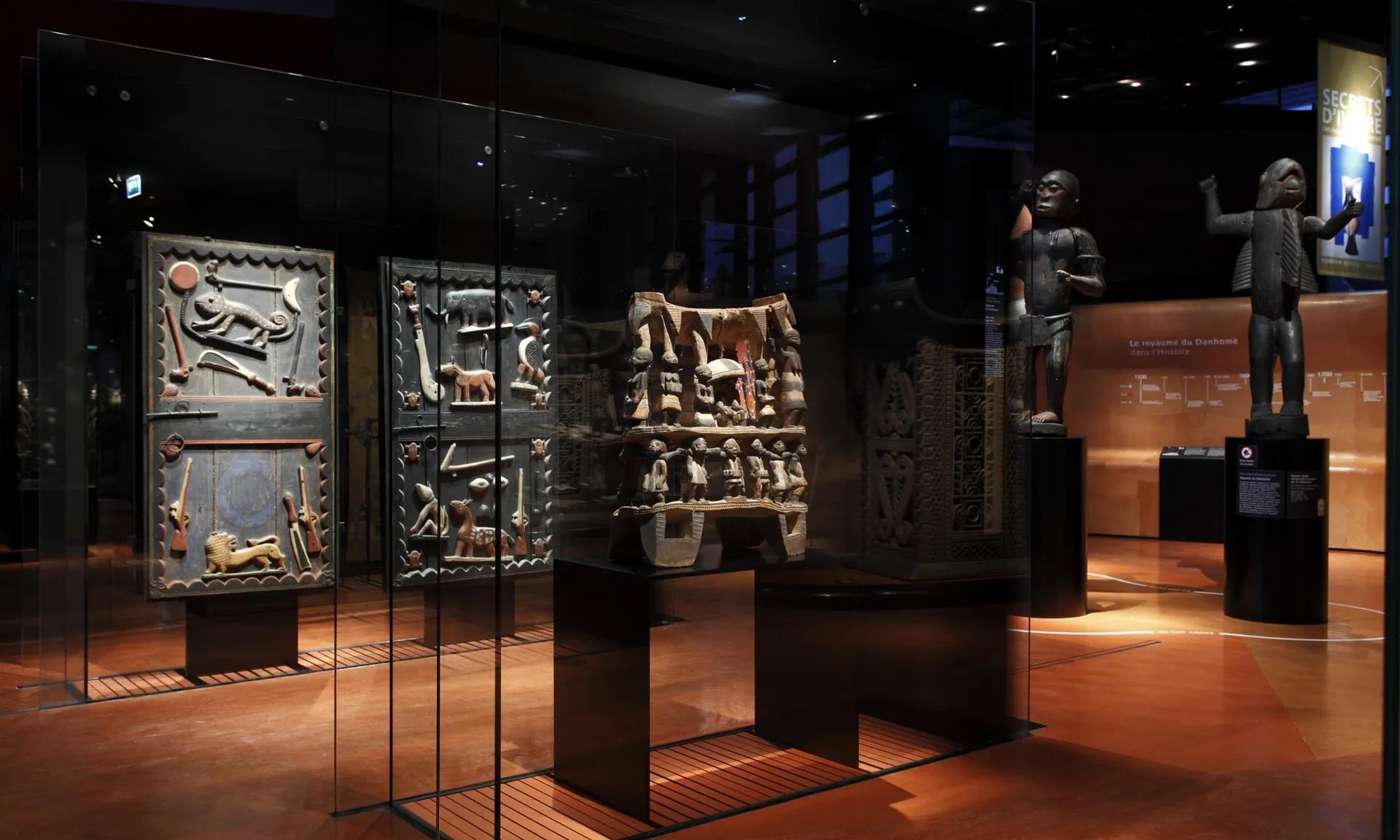Objects from the Musée du Quai Branly – Jacques Chirac's Africa collection © Musée du Quai Branly – Jacques Chirac. Photo: Lois Lammerhuber
The Musée du quai Branly—Jacques Chirac in Paris is staging a farewell ceremony for the 26 objects about to be returned to Benin. An exhibition of the statues, thrones and ceremonial hatchets opens today—for five days only. French President Emmanuel Macron is due to visit the exhibition on Wednesday.
The restitution of the African artefacts was promised by the French president during a 2017 tour of West Africa, as a “first symbolic step” for an ambitious “return of African heritage”. Although nothing on this scale has happened in the four years since, the 26 items at the Quai Branly looted by French troops from Abomey’s royal palace in 1892 could be returned as early as this November. A special law had to be passed through parliament last year to make this possible. Both heads of state still have to sign a treaty before the objects' departure.
However, an uneasy tension is building around the event because Benin is now demanding more from France. “The French know that 26 works do not represent all our requests,” Benin’s culture minister Jean-Michel Abimbola told the newspaper Le Monde, while the president of Benin Patrice Talon told local media he “was not satisfied” as he is expecting “full restitution”. The culture minister specifically asked for the return of a statue of Ogun, the voodoo god of iron and war, much admired by Modern artists and writers and displayed at the 1935 African art exhibition at the Museum of Modern Art in New York. French official sources replied that it was not on the list Benin presented to France in 2016, unlike the 26 artefacts in the Quai Branly exhibition.
These items are destined for a new museum at the palace in Abomey, which is under restoration with French help. Benin has not yet provided an opening date. In the meantime, the items will be held in the Portuguese Fort of Ouidah, which was a major slave-trading port on the Atlantic coast. The site is also under restoration, financed by the World Bank.
A symposium, a concert and movie projections at the Quai Branly Museum will mark this week dedicated to the culture and history of the West African nation. The exhibition itself has proven to be a difficult balancing act for its curator Gaëlle Beaujean, the head of the African collection at Quai Branly and a consultant for the future museum in Abomey. The show avoids to mention that the 26 objects were recovered by French soldiers in palaces that had been torched by the king of Dahomey before he fled. It also minimises the role of the kingdom in the exploitation of and trade in slaves, since the end of the 16th century. Beaujean says she chose to focus on the objects themselves, “lacking time and space” to confront historical context, especially when these assertions “are disputed among scholars”.
But members of the senate, despite giving their consent to the restitution, claim that the museum has been caught up in “a diplomatic game” led by the Elysée Palace. Twenty-three senators protested against President Macron ordering new restitutions to the Ivory Coast, Madagascar and Senegal. On 13 October, the senators proposed a bill to set up a “scientific advisory body” for restitution procedures. But the move was opposed by the government and there is no chance that the text will be discussed before the general election next spring.
UPDATE 28 October: French President Emmanuel Macron called for "a new law" to establish a framework for restitutions to foreign countries. On Wednesday, during his visit to the Quai Branly where the items from the Royal Palace of Abomey were exhibited before their departure to Cotonou, Macron called for "common projects, common exhibitions" with African, Latin American or Oceanian countries, but also for the return of "treasures whose absence is intolerable for them". He said: "I know this is a sensitive and historically divisive subject, but we are here to build new horizons, not open new divisions." However, he warned, "it would be madness to renationalise this public heritage", adding: "It would make no sense for France to dispose of its foreign collections and for each country to take its own treasures home."
Benin's Foreign Affairs Minister Aurelien Agbenonci praised this "strengthening of the cultural partnership with France" and announced that a complete "repertory" of items in French collections coming from the territory of Benin was being drafted by both countries, which could lead to new demands. The president of Benin, Patrice Talon, did not attend the ceremony. And the Culture Minister Jean-Michel Abimbola revealed to The Art Newspaper that his country has "several times now demanded the restitution of the statue of the god Ogun", which is not among the 27 pieces to be shipped to Benin in November, following the signature of a pact between the two heads of state. These items will be exhibited for three months from mid-January at the presidential palace in Cotonou, the minister said, before being stored in the ancient fort of Ouidah, awaiting the completion of the new museum of Abomey in three years.

